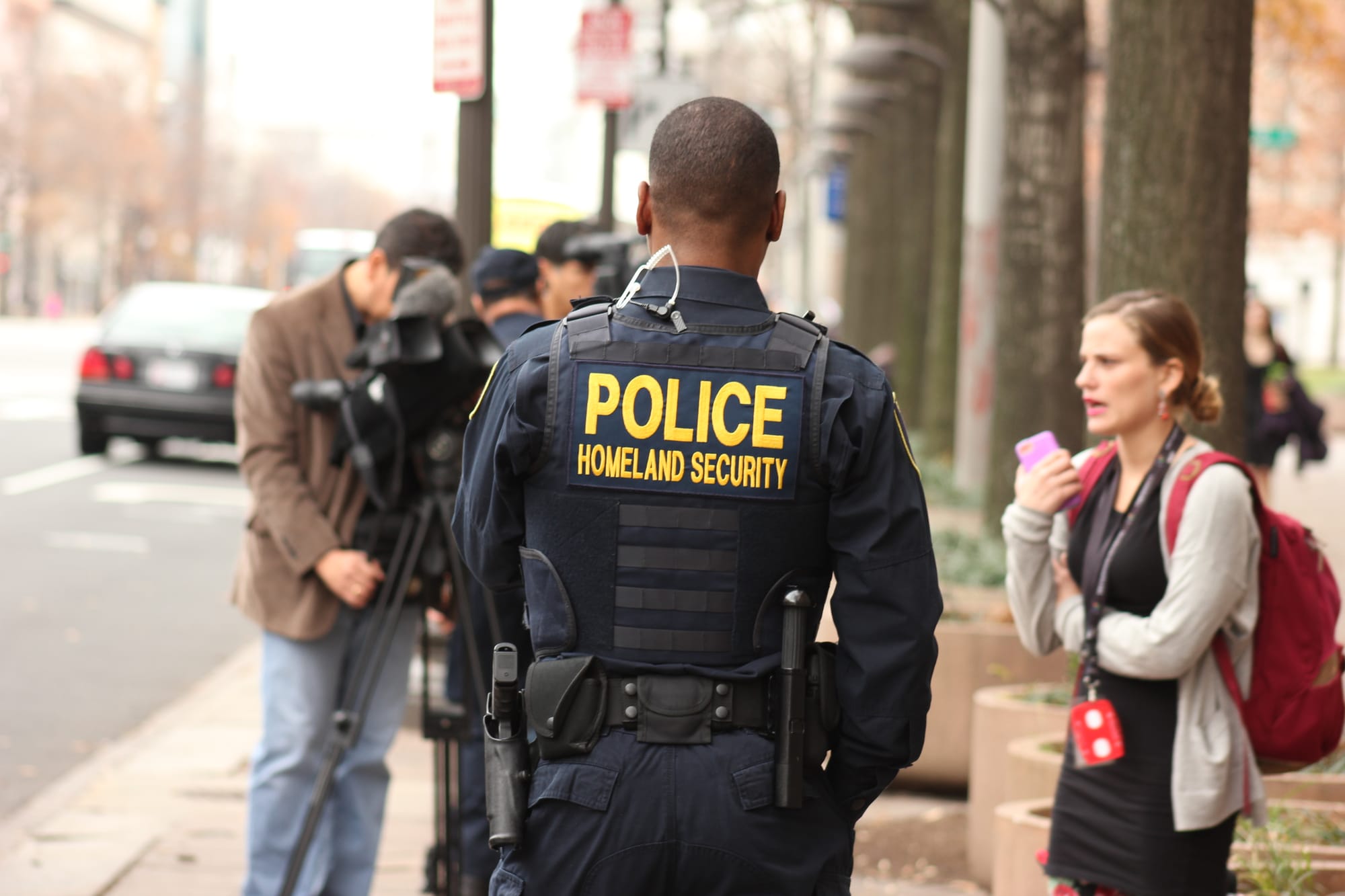Wilson Building Bulletin: A cold dose of reality on D.C.’s budget
And Trayon White gets a new trial date.
Trump has threatened mass deportations, but D.C. residents still have rights. We've rounded up strategies to protect yourself and your community.

Sleet came down outside as almost four dozen people squeezed into the narrow living room of a Shaw rowhouse on Saturday. Another dozen listened from the hallway as the crowd learned the legal basics of responding to immigration officers in their homes, workplaces, or neighborhoods following President Donald Trump’s inaugural promise to deport “millions and millions” of immigrants.
“Community members and allies, we’re trying to protect each other and that’s a good feeling out of a really bad situation,” said Alfredo Castro, one of the afternoon’s trainers and an organizer with Son La Lucha, a community group that blends know your rights trainings with Mexican folk music performances. “The way you decrease fear is by giving people the [right] tools.”
The crowd watched a video of Trump’s border czar’s recent complaints on CNN that Know Your Rights trainings in Chicago have made it harder for ICE agents to make arrests. Immigration lawyer Grace Kurlandmann told the crowd these videos exemplify what they’re hoping to do in D.C. — the more people who understand their rights, the better residents can protect themselves.
“Everyone has constitutional rights regardless of citizenship status,” said Kurlandmann.
We rounded up some of the tips shared at Saturday’s training, as well as information and advice from other legal experts and advocates in the city. We’re not lawyers and this isn’t legal advice (we have numbers for that below), but having this information on hand may better equip you to protect yourselves and your neighbors.
One major potential change is the Trump Administration’s reversal of the policy that provided additional protections from immigration enforcement in places like schools, churches, food pantries, and hospitals.
“Other than the constitutional protections that we all have, the new directive essentially would allow for ICE agents to have unchecked, unbridled power to enforce in those spaces using, it seems, only ‘common sense’ as the guiding principle,” says Scarlett Aldebot, ACLU D.C. Policy Advocacy Director, noting that the policy has not been fully released, so exactly how the administration plans to carry it out is unclear.
The Department of Homeland security also expanded what is called “expedited removal,” increasing the possibility that an undocumented person could be rapidly deported without the right to a trial. Previously, this policy was only for people who had been in the country less than two weeks or who were within 100 miles of the border. The administration has said it plans to use it nationwide against anyone who has been in the country less than two years.
Administration officials have also said they’ll pursue what are called “collateral arrests,” arresting potentially undocumented coworkers, family members, or even bystanders when agents set out to arrest someone with a criminal record. The administration’s decision to end Temporary Protected Status (TPS) for Venezuelans also has many worried he’ll further dismantle the program, which over three thousand D.C. residents from places like El Salvador and Ethiopia could be affected by.
The figures the administration has released about deportations have so far come with extremely limited details, making it hard to know exactly how these changes are being implemented or how much deportations have increased.
Kurlandmann says that enforcement is up in D.C. and that the administration’s recent expansion of immigration enforcement to all federal authorities, such as the Federal Bureau of Investigations, the Drug Enforcement Administration, and U.S. Marshals could have particular implications for District residents, given how many federal agents there are in D.C.
While many advocates suspect the administration’s deportation agenda involves at least some smoke and mirrors, they say the fear is also part of the point.
“You can feel the vibe on the streets, people aren’t coming out — the streets and the parks are empty more than ever, people are staying home and it’s harder to organize people,” Castro says.
Aldebot says they’re recommending that anyone undocumented who has been in the country over two years should always carry proof of that with them — this could include utility bills, school enrollment information, or a rental agreement— to protect themselves from the threat of expedited removal.
She adds that they’re focused on making sure people know their constitutional rights, which remain in place regardless of how ICE or the federal government decide to prioritize arrests and deportations
“Constitutional rights still apply to folks that are immigrants. Constitutional rights still apply to places where there is a reasonable expectation of privacy,” says Aldebot.
You can read more about those rights below.

Through your closed door, ask them to identify themselves and if they have a warrant signed by a judge, says Aldebot. Tell them to slide the warrant under the door or hold it up to the peephole or a window. She adds that you should make sure the warrant is signed by a judge and has the name of the person residing in the home, otherwise they can’t enter without your consent.
“Don’t open the door, never open the door, you don’t have to open the door; if they don’t have a warrant signed by a judge, don’t open the door no matter what they say,” says Kurlandmann.
The ACLU advises that you do not tell the agents anything except that you don’t consent for them to enter, that you don’t want to talk to them without a lawyer, and that you want them to leave.
It’s possible they won’t listen, says Kurlandmann, but clearly stating these things can help if you go to court.
Take pictures of any documents they showed you and, once they leave, take notes on everything you remember — this can also help you in court.
If they don’t have a warrant signed by a judge, ask them to leave. If they start to search, tell them you don’t agree to it. According to the ACLU, stating these things clearly, even if the officers don’t listen, can help you in court. Ask for the ID and contact information of the officers. Don’t answer any questions or show any documents except for a valid U.S. passport or green card and don’t sign anything without a lawyer present.
“You have the right to remain silent. You don’t have to answer questions,” says Aldebot, adding that, even if they ask, you shouldn’t share information about where you were born or how you entered the U.S. “The answers to those questions can be used against you in a proceeding later.”
Kurlandmann and Castro’s training shared a list of phrases that can be helpful when interacting with immigration officers who do not have a warrant signed by a judge.
You have fewer rights on the street than you do in a private home, says Kurlandmann, and officers only need reasonable suspicion to make an arrest.
The ACLU advises you to ask the agents to identify themselves, and then ask if you’re free to go. If they say you are, leave.
(This advice applies to any arrest — if you want to learn more about your rights during an arrest in D.C., we have an explainer for that too).
If they say you are not then don’t run. Don’t say anything, the ACLU advises, except: “I want to use my right to remain silent,” and “I want to speak to a lawyer.”
Aldebot advises against carrying foreign passports with you. If you have valid immigration documents like a work permit, a green card, or a pending asylum case, carry proof with you.

You have the right to film an ICE interaction as long as you don’t interrupt or do it secretly, says Aldebot. You have the right to ask for officer identification and badge numbers (though they may not comply). It’s helpful to film continuously and capture street signs or landmarks, according to the Brooklyn Defender Services.
“One of the really important things — and this is with any interaction with law enforcement — is to stay calm, to keep your hands where folks can see them, and to make sure you let law enforcement know if you are going to reach into a pocket or bag to get a document,” says Aldebot, adding that you can remind the person of their rights as long as you don’t get in the way of law enforcement.
Anything a bystander says can be used in court: don’t identify the person being arrested, their immigration status, or their criminal history.
Advocates advise saving these numbers in your phone, and potentially flagging them in your favorites so they’re available quickly.
You can locate someone arrested at: Locator.ICE.Gov.
Last week, legislators introduced a bill (the BOWSER Act) that aims to eliminate the city’s local government wholesale, heightening long standing fears that the Trump administration and Republican legislators have their sights set on ending home rule. Kurlandmann says this would be “devastating,” and could have particular implications for undocumented residents — particularly if D.C. loses control of its police force.
She also worries, however, that concerns about this threat may overshadow what undocumented residents are already facing. "I'm a little afraid that the D.C. government is so concerned about home rule being attacked, that they're going to shy away from really standing up for immigrants," she says.
D.C. was part of a lawsuit at the end of January seeking to block Trump’s order ending birthright citizenship. At the time, immigrants-rights advocates noted the silence from Mayor Muriel Bowser and other top officials on the topic. Since then, many advocates have noted Bowser striking a relatively conciliatory tone with the Trump Administration.
But even with home rule, D.C.’s lack of statehood has long interfered with the city’s ability to govern itself — including when it comes to undocumented residents.
The president has the power to control D.C.’s police if an emergency is declared — a strategy Trump has already deployed to send additional forces to the U.S.’s southern border. Last year, the House passed legislation to roll back D.C.’s law that gave non-citizens local voting rights (it was not taken up by the Democratic-led senate). And D.C.’s status as a sanctuary city, or a city that limits local law enforcement cooperation in deportations, is complicated by the fact that D.C.’s Superior Court is federally funded and staffed by U.S. Marshalls. In 2018, this resulted in a D.C. resident facing deportation for a non-violent theft, which in most cases would have resulted in him being charged and quickly released.

After assessing your safety, you can loudly announce ICE’s presence and remind people of their rights — as long as you don’t interfere with law enforcement.
“If you have the power to say something, say it. If you see ICE on a train or a public place then stand up and remind people about their rights. That would be wonderful if the community could do that,” Castro says.
But equip yourself with the proper information beforehand; you don’t want to create panic unnecessarily.
Kurlandmann says she’s seen people circulating warnings about ICE sightings on social media or listservs in recent weeks, but often without taking the time to confirm the rumors with a local immigration group. Recently, she says, a false rumor about ICE showing up at a local food pantry deterred people from picking up groceries they needed for fear of being arrested.
Still, Kurlandman says this shouldn’t make people afraid to share important information. They should instead make sure what they’re sharing is accurate and that it comes paired with clear details about how people can protect themselves.
Aldebot says they have started hearing reports from other jurisdictions of children returning home to find their parents deported. Creating a safety plan in advance of anything like this happening is extremely important if you, a friend, or family member could be at risk.
In Washington D.C. you can appoint a caretaker for your kids in the case of detainment or deportation, which you should discuss with them in advance. You should also ensure another trusted adult can take care of your finances.
Aldebot says not to carry that safety plan with you but to make sure a trusted friend or family member knows where to access it. She adds that you should not only make sure you have the contact information for a lawyer, but to ensure that anyone you consult with has appropriate training.
The American Immigration Lawyers Association has a directory you can search and the National Immigration Project has an online find a lawyer tool that includes Washington D.C. attorneys.
In its guidance on immigration enforcement in schools, the Office of the Attorney General for the District of Columbia lists several organizations that can assist immigrants in need of legal help, including AYUDA (202-387-4848), CAIR - Capital Area Immigrants Rights Coalition, CARECEN (Central American Resource Center) (202-328-9799), and the Catholic Charities of the Archdiocese of DC Immigration Legal Services (240-858-0958).
If you’re a citizen, Kurlandman says to reach out to your neighbors who aren’t to see what they need support with — whether it’s setting up the above systems or walking their kids to school because they’re afraid to do so themselves.
“Most people can tell you what they need if you ask them.”
This story has been updated to attribute advice about filming continuously and capturing street signs or landmarks to the Brooklyn Defender Services.
With your help, we pursue stories that hold leaders to account, demystify opaque city and civic processes, and celebrate the idiosyncrasies that make us proud to call D.C. home. Put simply, our mission is to make it easier — and more fun — to live in the District. Our members help keep local news free and independent for all: